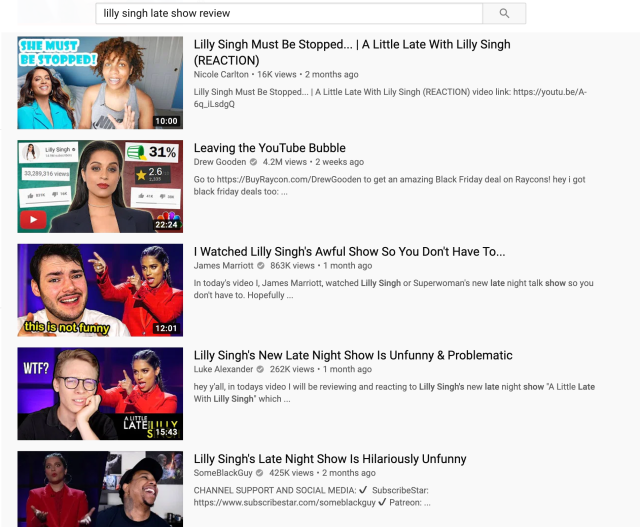Social Media Influencer: Lilly Singh – Karen Song (Post #3)
December 16, 2019 at 11:51 pm Leave a comment
Lilly Singh is a Canadian influencer and comedian who gained immense popularity as a Youtuber with her channel IISuperwomanII. Her fanbase of younger viewers, including myself, quickly grew as she rose to fame with her relatable personality and parodic videos. She gained popularity for her distinct voice and commentary on her Indian heritage, and in 2017, she became one of the top 10 highest paid influencers on the platform. This all changed in March 2019, when NBC announced that she would be hosting their new late night talk show: A Little Late with Lilly Singh. Although much of the shift in her public persona and perception can be attributed to the stark contrast in the two platforms – one being an independent Youtube channel, and the other being a program on a major American channel – viewers soon began to individually criticize her for adopting a new voice that only served to appease network television’s superficial desire for greater diversity. Below, I’ve attached a screenshot of the first page of results that appear when you search for “Lilly Singh Late Show Review” on Youtube today.

The response is stunningly negative, with some stating that she is simply not funny or skilled enough to take on the mantle of a late night talk show host, and others diving deeper into her behavior which propels a “problematic” liberal agenda. What’s worth noting here is how the critique comes from all angles, including her fans and people of intersecting minority groups as well as those who feel attacked by her extreme stance against cis-het white men. Much of the issue that audiences have lies in how she has constructed her host personality around her identity as a bisexual woman of color and participates in what some have called “oppression olympics,” wherein she continuously emphasizes how she is less privileged than her competitors as a primary marketing strategy. Before the show premiered, promo videos began to circulate the internet which mostly consisted of her stating that she was the first person of color or LGBTQ identifying host of a talk show, which in turn led people to comment on how she ignored the revolutionary work of Oprah Winfrey or Ellen DeGeneres. This all begs the question, how has Lilly Singh and her new show contributed to the state of Asian American representation today?
In her text in The Routledge Companion to Asian American Media, Professor Kido Lopez discusses how Asian Americans have often only been able to break into the mainstream through depictions of “violent heteromasculinity and bourgeois materialism,” though they can also exaggerate these qualities in a satirical manner to “remind viewers that Asian American bodies are so often denied access to these kinds of roles” (Lopez, 163). In this same vein, Lilly Singh has tried to challenge the hegemonic norms of late night television by performing a hypermasculine archetype in the name of parodic comedy. Though her aim is clear – to subvert the dominant narrative and characters seen on late night TV whilst emphasizing her distinct minority status – the execution of this vision has further alienated audiences, both progressive and conservative. We see this in the cold open of her first ever episode, wherein she goes to extreme lengths to show how she stands out from the cis-het white men who dominate network and cable late night talk shows. In the intro, she asserts that she is different from all the “Jimmy”s (referencing Jimmy Fallon, Jimmy Kimmel, and James Corden), whilst wearing a power suit, showering the table with cash, and exhibiting power through violence (swinging a bat, kicking her white coworkers out of their seats, and throwing shoes at them). She does this all through a rap performance and music video – which also elucidates another common criticism that people have about her use of AAVE and appropriation of Black culture. All of this goes to show how her distinct and previously relatable voice as a QPOC is now being masked by her extreme performativity as she navigates this new space.
A Little Late with Lilly Singh Intro
What I personally find unfortunate about this situation, as a fan of Singh’s old Youtube channel, is how her performative behavior and the backlash against it has completely overwhelmed the narrative of an Asian American being represented on late night television, which is worth celebrating. There was and still is so much potential for positive representation on these platforms where Asian Americans have previously not broken into, and this first season of A Little Late should not put a dampener on that. Lilly Singh gained a following on Youtube through her comedic take on her cultural identity that resonated with her fans, many of whom were excited to see themselves represented in one of the top-grossing influencers of the decade. On one hand, I feel it is unfair to judge her by the same standards, seeing as her comedy and style might not translate directly onto this new platform. On the other hand, I agree with her critics and hope that, along with the other creators working on the program behind the scenes, she can grow and strengthen her voice as a trailblazer for underrepresented communities with a more nuanced approach.
Entry filed under: Uncategorized.
Trackback this post | Subscribe to the comments via RSS Feed